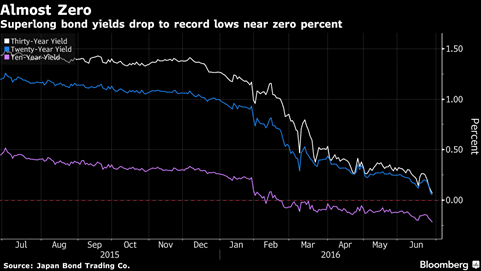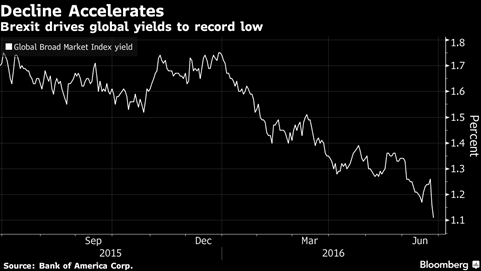Finally room to breathe. The pound shrugged off the S&P’s belated downgrade of the UK credit rating from AAA to AA and is up off its 31-year lows. Asian markets are in the green this morning. It’s not a massive move yet. But there are signs that the market reaction to being caught by surprise over Britain’s decision to leave the EU is giving way to more probing questions about what it all means.
Things are still so unusual that both the S&P 500 and the Volatility Index (VIX) fell at the same time yesterday. The S&P fell by more than 1.5% and the VIX by more than 5% on the same day for only the second time ever. The last time it happened was 2008. So what?
You don’t see stocks and the “fear gauge” falling at the same time. The VIX rises when investors want to hedge against uncertainty and falling stock prices. It falls when investors are in “risk on mode.” The VIX spiked by 49% on Friday. It fell by 8.4% on Monday. The S&P 500 fell by 1.81%.
What it may tell you is that those traders who did prepare for Brexit by hedging are cashing in their bets. The surge in selling and profit taking could abate. You’ll likely see some bounce-back buying, perhaps even in battered British bank stocks (especially the ones with earnings overseas from emerging markets and Asia).
Don’t count inflation out yet
Don’t take your eye off the bigger monetary and political picture. It might be hard for you to imagine that inflation could spring phoenix-like from the ashes of Brexit. But the point I made yesterday was simple: the more desperate central banks and governments get to beat back the tide of deflation and populism, the more likely they are to unleash inflation and then hyperinflation.
Look at what happened in the last 24 hours. The penny has dropped for the global financial class. They realise the political limits of cheap money to benefit debtors (governments) at the expense of savers (people) has been reached. They also realise there is no more patience for monetary policy that favours asset owners over wage earners. They can’t crank up the fiscal policy fast enough. In the last 24 hours you’ve seen:
- South Korea announce a $17 billion stimulus package.
- Crude oil and the Bloomberg Commodity Index rally, while gold falls.
- The futures market indicate a Fed rate cut is now more likely than a rate hike.
- Japan’s ruling party considering a $196 billion stimulus package.
The last one is the one to watch
True, I’d love to be a fly on the dining room wall when prime minister David Cameron meets European Council leaders in Brussels tonight. It could be pretty frosty. As chaotic as UK politics now is, it’s just as likely that Brexit has triggered a fundamental restructuring of the EU.
But markets will move faster than politics. Always do. Japan could push the helicopter money option sooner than anyone expects, if reports from Japan’s Nikkei newspaper are accurate.
The yen’s post-Brexit rise has been most unwelcome by prime minister Shinzo Abe and Bank of Japan governor Haruhiko Kuroda. Nikkei reported that advisers in Abe’s ruling party have recommended more fiscal stimulus. Emergency meetings were held Tuesday.
This is not about providing liquidity to markets. It’s about printing money and putting it in people’s hands so they spend it. When you have a systemic crisis of confidence – and a massive global political backlash against the financial class – you had better act quickly. Japan will lead the way.


Brexit has pushed us right to the frontier of how low bond yields can go. And then we’ve pushed right through it. In Japan, yields on 40-year government bonds fell to 0.075%. The 30-year yield fell to an all-time low of 0.05%. The yield on the 10-year note fell to negative 0.225%.
To a very smart Labrador retriever, those are just numbers and have no meaning. The fact that 80% of the Japanese government bond market has a negative yield would sound like, “ball!” But for investors, they show you how dangerous the current situation is. In seeking safety from political uncertainty, investors have accepted certain losses on government bonds (if held to maturity). It’s madness. And it’s not just Japan.
The yield on 10-year gilts fell below 1% for the first time ever on Monday, to 0.93%. Yields on 10-year US notes declined to 1.46%, not far from the record low of 1.38%. And even yield on sovereign bonds from commodity producing countries – which typically have to offer a higher yield to attract capital – are down. New Zealand’s 10-year yield fell to 2.3% and Australia’s 10-year yield fell to 1.95%.
There can be no doubt now that there is a massive government bond bubble. It’s the single achievement of seven years of quantitative easing and bond buying by central banks. The structural problems have been laid bare: high debt, low growth and high asset prices.
And so Corbyn was right, in his own way. “People’s QE” won’t work. Whatever form it takes – debt monetisation, helicopter money, stamp money – printing money and giving it to people as a bribe to make up for the last seven years will only create inflation. It will be politically popular at first, economically disastrous later. But will probably happen anyway.
Recap
The plunge in global bond yields in the last 48 hours makes the crack up of globalisation easier to understand. If QE between 2009 and now was good for Wall Street and the City, what comes next had better be good for Main Street and the people. It’s the only way to prevent a Europe-wide rise in populism that threatens the established political order (although the horse has left the proverbial barn on that one).
I’m not trying to be cryptic. Japan has shown the logical limits of bond buying. Once you’ve bought up all the bonds (or nearly all of them), the only thing left is to issue more debt and print more money. Or just skip the debt part and print more money. If it’s money that depreciates, it is self-liquidating. That will probably be the reason provided for why it’s not inflationary.
Either way, some combination of monetary and fiscal stimulus lies dead ahead, lest the current moment become the dreaded “Lehman moment.” It will have to be a move that benefits precisely the people who have been left behind by globalisation in the Western world. Politically motivated monetary policy – keep the masses happy by any means necessary – is what’s coming next.
It’s the point I made in the essay I sent you yesterday. Ultra-low government bond yields bring us one step closer to the endgame. Brexit – by revealing the huge divide between those who have benefitted from cheap money and cheap labour and those who have not – was the beginning of the endgame.
Survival strategy
Of course it’s not a game when you have a life’s worth of savings at stake. What can you do? What should you do as more people realise the only real recovery since 2009 has been in asset prices, and that global productivity growth is stagnant and the political tide has turned against integration and globalisation?
Think gold. Think local. Think real yields. I’ll get to gold in a moment. By “local” I mean you buy businesses whose earnings growth is not dependent on low interest rates and not threatened by higher rates. Local businesses that sell things people need every day are one place to look.
“Real yields” are harder to find. But you can look for stocks that have stable earnings and return those to shareholders regularly. They will, eventually, be much more attractive that government bonds. And gold?
Be cautious this week, as the big Brexit move may be a bit overcooked. But by the time the endgame is over, gold will be back as an important part of the global monetary system. Former Fed chairman Alan Greenspan gave a frank interview with CNBC recently where he said as much. He talked about inflation and the gold standard. Greenspan said:
I know if you look at human history, there are times and times again where we thought that there was no inflation and everything was just going fine. And I just basically say, wait. This is not the way this thing ordinarily comes up. I don’t know.
I cannot say I see it on the horizon
In fact, commodity prices are soggy. The oil price has had a terrific impact on global inflation. It’s not about to emerge quickly, but I would not be surprised to see the next unexpected move to be on the inflation side. You don’t have inflation now. And you don’t have it until it happens…
If we went back on the gold standard and we adhered to the actual structure of the gold standard as it existed prior to 1913, we’d be fine. Remember that the period 1870 to 1913 was one of the most aggressive periods economically that we’ve had in the United States, and that was a golden period of the gold standard. I’m known as a gold bug and everyone laughs at me, but why do central banks own gold now?
The first golden age of globalisation came on a gold standard – sound money, low taxes, free trade, political liberalism. The second golden age came on the dollar standard – cheap energy, cheap money, a massive debt boom, political centralisation. The first ended in world war. The second ended with what’s looking like a political civil war in Europe, including the UK.
In the meantime, take deep breaths. And feel free to send in your thoughts and reactions to [email protected]

Category: Geopolitics

